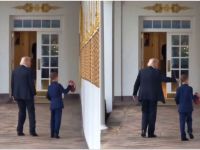Having spent weeks speculating about the contents of US Secretary of State Colin Powell's vision of the Middle East, many Israeli commentators felt let down Tuesday that the speech was strong on emotion but short on detail.
"We waited for this speech for three months and he said nothing new or exciting. Powell's 'vision' was, how can I say it, like reheated pasta," said analyst Hemi Shalev, writing for the daily Maariv.
He described the speech, seen as a key to US engagement in the regional crisis that has lasted 14 months and cost almost 1,000 lives, as "much ado about nothing," something he said would please the Israeli government, wary of foreign intervention in its security concerns.
"Prime Minister Ariel Sharon's spin doctors gave a sigh of relief, declared victory and quickly filed Powell's speech away in the attic," he said.
"But if there is any room for Israeli complacency, it is only in the short run. Stop the terror now, said Powell, but he immediately followed with stop the settlements, and stop the occupation," Shalev said.
Simon Schiffer, writing for the mass-circulation Yediot Aharanoth, was even more scathing, saying "the thing missing from Powell's speech was teeth."
He said Powell's talk at Louisville, Kentucky, boiled down to the fact that "the solution to the Israel-Palestinian conflict will only come about when the parties make the decisions they have to make.
"This sentence has been ground to death by Bush administration officials. Freely translated, it means: This is an invitation to continue the bloody situation in the fighting that has been going on for a year."
However, Orly Azulai-Katz, writing for the same newspaper, said Powell's determined tone was more important than his words, which Washington had in fact stressed would contain a broad outline rather than a detailed plan.
"Powell spoke like the representative of a superpower that just now has managed to restore to itself the role it was always identified with, the world's sheriff," she said.
The conservative English-language Jerusalem Post said Powell's address was "too heavily laden with the primary mistake of US policy: putting the Israeli-Palestinian conflict at the center, rather than a satellite that revolves around the larger Arab-Israeli-conflict."
The paper's editorial said the problem centered on "the Arab states' inability to integrate into the modern world.
"The US vision seems to be moving in the right direction, but it is a long way from spelling out the revolutionary changes necessary to create a more stable and peaceful regional order," the daily concluded.
Powell on Monday vowed stepped-up US engagement in the Middle East, starting with the dispatch of two envoys to the region, but demanded concessions from both Israel and the Palestinians.
In a long-awaited statement of Washington's Middle East policy, Powell told Israel to end its occupation of Arab lands and instructed the Palestinians to crush terrorism.
"We will push, we will prod," Powell said, devoting more than half of a 45-minute major foreign policy address here to US efforts to bring the two sides back to the negotiating table and reach a peace settlement.
"But notwithstanding everything we do, at the end of the day, it is the people in the region taking the risks and making the hard choices who must find the way ahead," he said -- JERUSALEM (AFP)
© 2001 Al Bawaba (www.albawaba.com)







